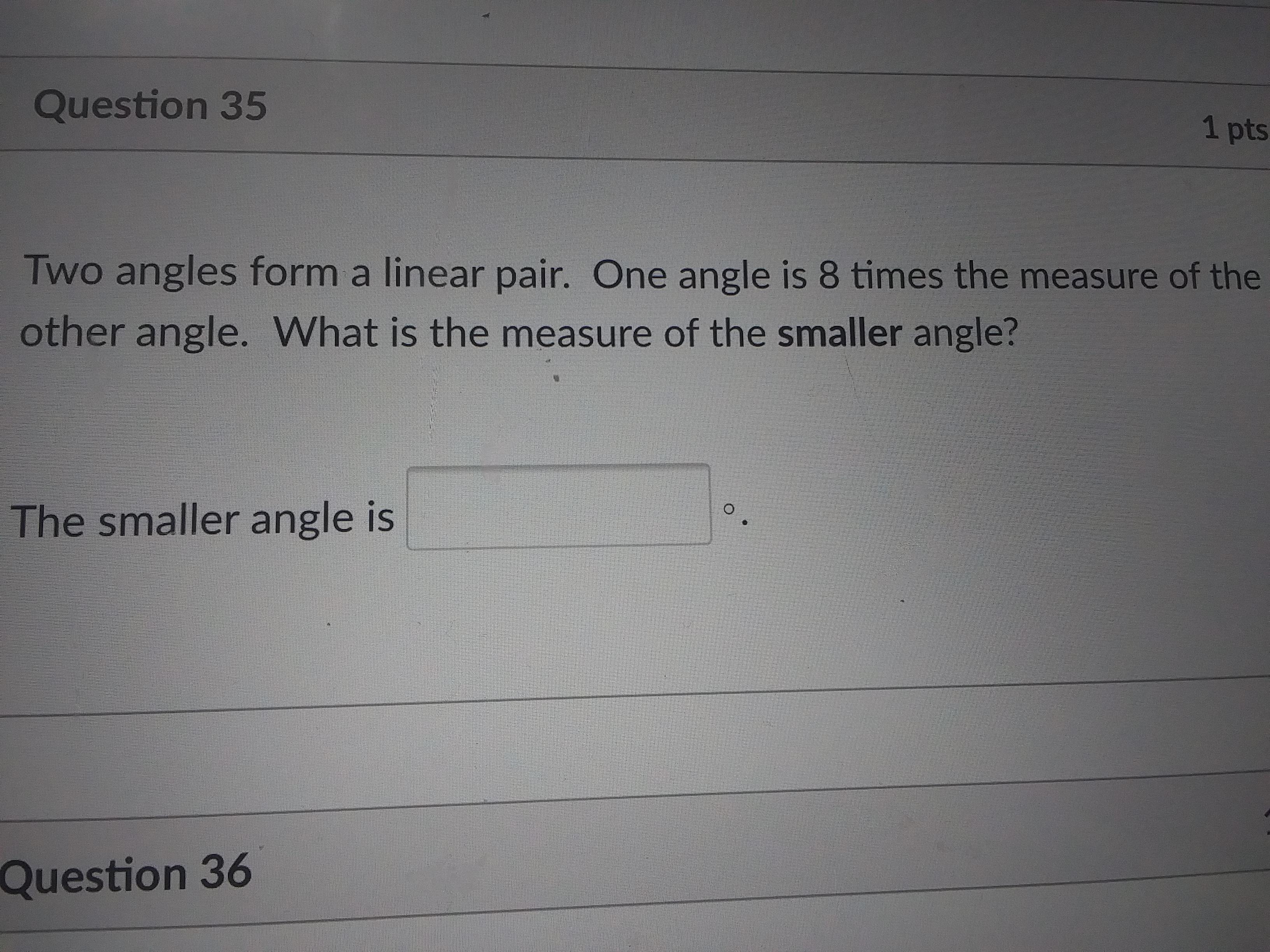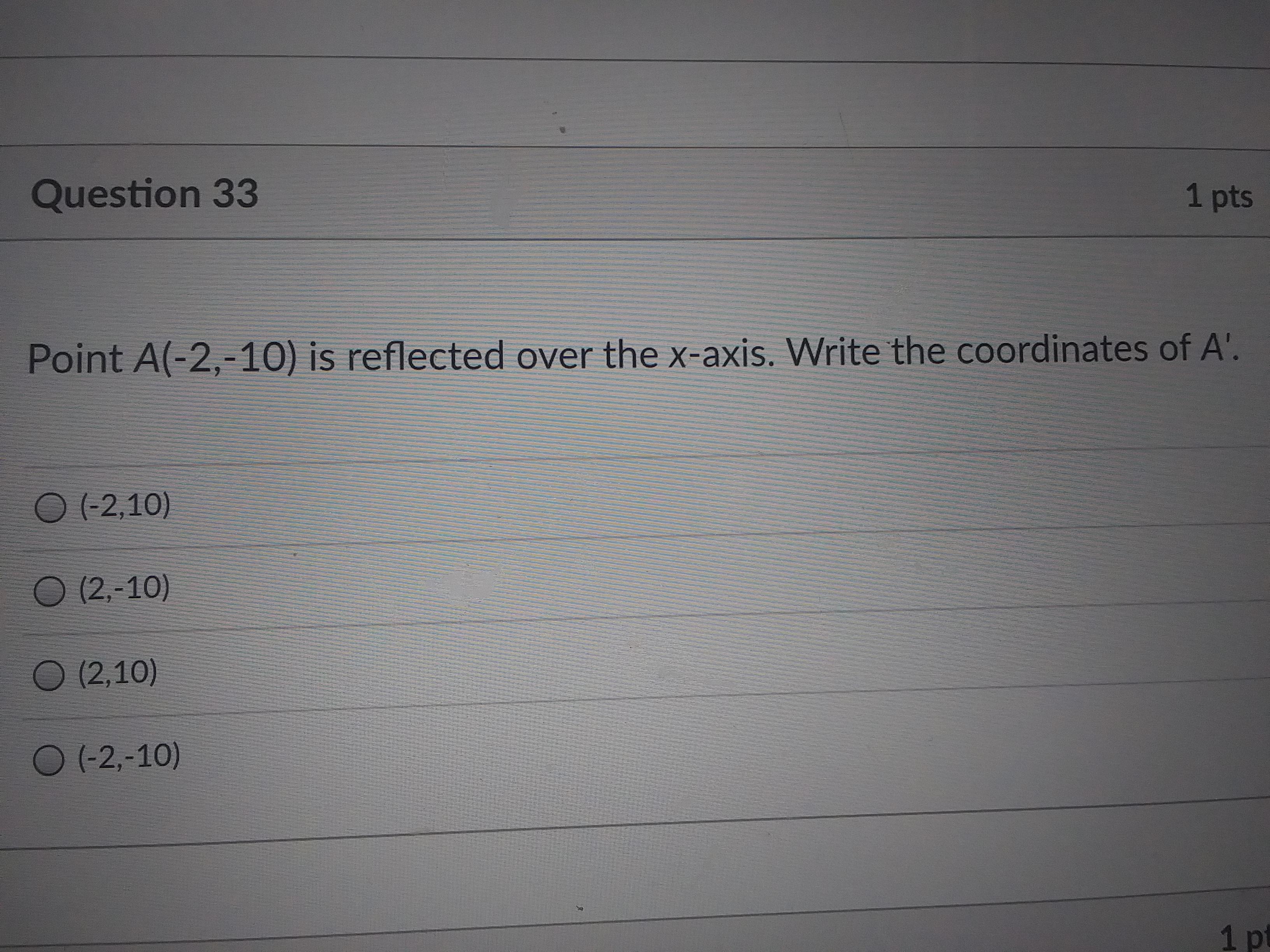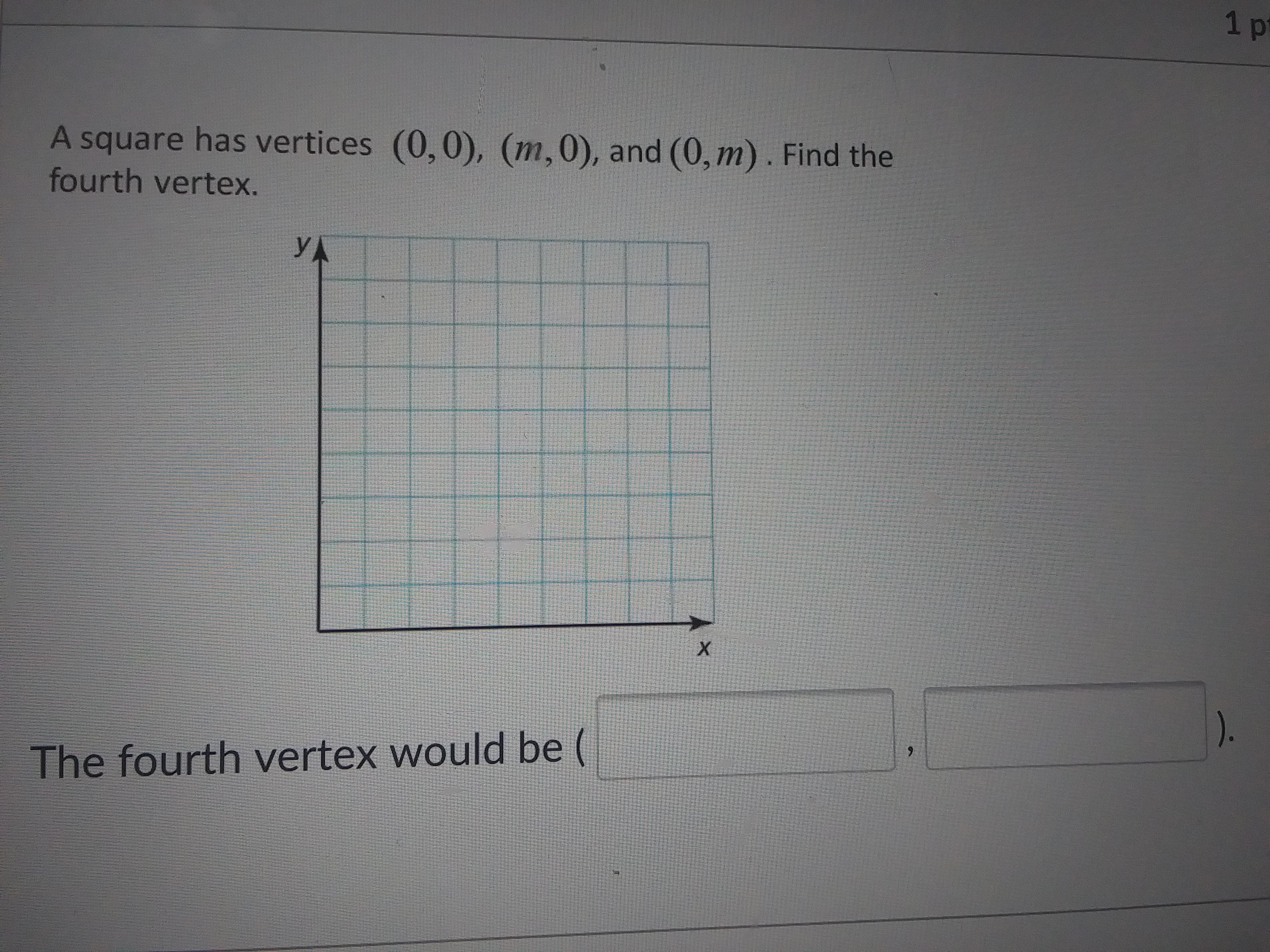Answers
Answer:
Q1Angles forming a linear pair are supplementary and sum to 180°
x + 8x = 180°9x = 180°x = 20°The smaller angle is 20°
Q2A(-2, 10) reflected over x-axis
Rule for such a reflection is:
(x, y) → (x, -y)Point A will map to:
(-2, 10) → (-2, -10)Correct option is D
Q3One point is at the origin and two other points are at the distance m horizontally and vertically from the origin
The last point will have same distance m from the point (m, 0) and (0, m) and this will be point:
(m, 0 + m) = (m, m)Related Questions
Calculate an
8% tax on an
$80 tablet.
Answers
Answer:
$6.40
Step-by-step explanation:
All you have to do is find 8% of 80 dollars. That means you do 8/100x80/1 which is equal to 32/5. Simplify this improper fraction to get $6.40. This means that 8% of 80 is $6.40.
PLZZ HELP find the area of the triangle QRS?
Answers
Answer:
180 is the answer
Step-by-step explanation:
Step-by-step explanation:
To find out areas of rectangles, you have to count the left side of the rectangle which is (12) and then count the bottom of the rectangle which is (15)
Then multiply 12 times 15 to find out the area
15 x 12= 180
what do you mean CDEF
and can I get brainliest?
Iyanna and her family took a three-day trip. They drove 178 miles on the first day, 188 miles on the second day, and 163 miles on the third day. If the entire trip took 8 hours, what was the average driving speed?
Answers
Answer:
62 mph
Step-by-step explanation:
PLEASE HELP what does r equal to?
Answers
Answer:
R=15 1/6
Step-by-step explanation:
You can add 5 and 1/6 to each side so -5 1/6+5 1/6= 0 so it cancels out therefore on the other side of the equal side you add 5 1/6+10 to get 15 1/6.
Answer:
r=25
Step-by-step explanation:
i did the test lol
on Encircle the letter of the correct answer.
1. What is the abbreviation of pint?
2. What is the abbreviation of quart?
b.pt
c. pn
b.pt
C. ut
3. What is the equivalent of 2 teaspoons into ml?
b. 20ml
b. 15ml
c. 10ml
c. 9
4. What is the equivalent of 1 Tablespoon into teaspoon?
a. 3
b. 6
5. How many gallon in 4 quart?
b. 4
b. 3
6. How many gallon in 1 pint?
a. 1/2
b. 1/3
c. 1/4
7. How many ounces in 1 pound?
c. 2
b. 16
b. 10
8. How many dozen in 72 pieces?
c. 5
a: 1
c. 6
b. 3
9. How many fluid oz. in 1 cup?
b. 13
b. 10
10. What is the abbreviation of Pound?
c. 8
alb
b. ml
c. kg
Answers
Abbreviation of quart: qt
What is equivalent of 2 teaspoons into ml: 9ml
What is equivalent of 1 Tablespoon: 3
How many gallon in 4 quart: 1 us liquid gallon.
How many gallon in 1 pint: 0.125 us liquid gallon.
How many ounces in 1 pound: 16
How many dozen in 72 pieces: 6 dozen
How many fluid oz. in 1 cup: 8 us fluid ounces.
What is abbreviation of Pound: alb.
Hope this helps! =D
Robin read 63 books last year. She read 9 more books than
Trisha. The equation b + 9 = 63 gives the number of books b
that Trisha read last year. Which is the solution of the
equation?
Answers
Answer: 54
Step-by-step explanation:
63-9 you can't take 9 away from 3 so you must borrow, the 6 becomes a 5 and the 3 becomes 13. 13-9 is 4, bring the 5 down and you have 54.
Find the size of angle X.
Answers
Answer:
Because the sum of the interior angles of a triangle is 180,
X=180-(65+35)
X=180-100=80
PLEASE HELP THIS IS DUE IN 20 MINUTES
Describe fully the single transformation that maps shape A onto shape B.
y
4
A
2
1
B
-5 -4 -3 -2 -1 0
-1
1
2 3 4
X
5
-2
-3
-41
Total marks: 2
Answers
Answer:
I think shape A is just reflected, and make Shape B.
The reflection line is on 2 of the y axis
Step-by-step explanation:
heeelelppppppp it is area of a circle help me plz i will make you the brillientest
Answers
• Saphia is organising a conference.
People at the conference will sit at circular tables.
Each table has a diameter of 140 cm.
Each person needs 60 cm around the circumference of the table.
There are 12 of these tables in the conference room.
A total of 90 people will be at the conference.
Are there enough tables in the conference room?
Answers
Answer:
No
Step-by-step explanation:
Two rectangles are similar. Which proportion
could you solve to find the missing side length?
ILL GIVE U BRAINLEST PLEASE HELP ME
Answers
Answer:
D
Step-by-step explanation:
Answer:
d
Step-by-step explanation:
x=6
Hopefully it is correct and I tried my best good luck
Someone help me it’s timed !!
Answers
Answer:
Alternative exterior angles --> <1 and <7
Corresponding angles --> <2 and <6
Alternative Interior angles --> <3 and <5
Hope this helps and stay safe, happy, and healthy, thank you :) !!
Help I will be marking brainliest!!!
A. 18√3
B. 56√3
C. 36√3
D. 56
Show work, if possible. Thanks❤️
Answers
=============================================
Explanation:
We'll need the tangent rule
tan(angle) = opposite/adjacent
tan(R) = TH/HR
tan(30) = TH/54
sqrt(3)/3 = TH/54 ... use the unit circle
54*sqrt(3)/3 = TH .... multiply both sides by 54
(54/3)*sqrt(3) = TH
18*sqrt(3) = TH
TH = 18*sqrt(3) which points to choice A as the final answer
----------------------
An alternative method:
Triangle THR is a 30-60-90 triangle.
Let x be the measure of side TH. This side is opposite the smallest angle R = 30, so we consider this the short leg.
The hypotenuse is twice as long as x, so TR = 2x. This only applies to 30-60-90 triangles.
Now use the pythagorean theorem
a^2 + b^2 = c^2
(TH)^2 + (HR)^2 = (TR)^2
(x)^2 + (54)^2 = (2x)^2
x^2 + 2916 = 4x^2
2916 = 4x^2 - x^2
3x^2 = 2916
x^2 = 2916/3
x^2 = 972
x = sqrt(972)
x = sqrt(324*3)
x = sqrt(324)*sqrt(3)
x = 18*sqrt(3) which is the length of TH.
A slightly similar idea is to use the fact that if y is the long leg and x is the short leg, then y = x*sqrt(3). Plug in y = 54 and isolate x and you should get x = 18*sqrt(3). Again, this trick only works for 30-60-90 triangles.
yea... pls help me pls!
Answers
Answer:
960
Step-by-step explanation:
12x10x16=1920
1920/2=960
A construction worker is placing rivets in a new bridge. He uses 42 rivets to build the first 32 feet of the bridge. If the bridge is to be 2200 feet in length, predict the number of rivets that will be needed for the entire bridge.
Answers
Answer:
42 rivets=32ft of the bridge
1 ft of the bridge =42/32 rivets
2200 ft of the bridge =42/32×2200=2887.5
2887 and half
rivets that will be needed for the entire bridge.
WHAT IS THE ANSWER PLEASE HURRRRYYYYY
Answers
Answer:
1238
Step-by-step explanation:
hindi ko alam ask mo nalang sa mama mo hahaha baka sakaling alam niya yung sahot na tinatanong mo hahaha
how many cups of each were sold
Answers
Answer:
how many cups of what were sold
Step-by-step explanation:
??????????????
PLEASE HELP ME!!!! I WILL MARK!!!!!!! COME ON.
Answers
This is the same as y = x+13
=============================================================
Explanation:
Let's find the slope
I'll use the first two rows as the (x1,y1) and (x2,y2) points
m = (y2-y1)/(x2-x1)
m = (19-18)/(6-5)
m = 1/1
m = 1
The slope is 1.
Now apply the point slope formula and solve for y
y - y1 = m(x - x1)
y - 18 = 1(x - 5)
y - 18 = x - 5
y = x-5 + 18
y = x + 13
f(x) = x + 13 is the final answer
As a check, note how something like x = 5 leads to...
f(x) = x+13
f(5) = 5+13 ... replace x with 5
f(5) = 18
We see that x = 5 leads to f(x) = 18. That verifies the first row. I'll let you check the remaining three rows.
The equation y = x+13 has slope 1 and y intercept 13.
Write an equation that has an a-value of -2, a b-value of 1, and a c-value of 3.
Answers
Answer:
23
ewr
Step-by-step explanation:
Construct a probability distribution for the data.
7. The probabilities that a patient will have blood drawn 0,1,2, or 3 times in a visit are 6/15, 5/15, 3/15, and 1/15, respectively.
Answers
Answer:
X : ___ 0 ____ 1 _____ 2 ______ 3
P(X) : _ 6/15 __ 5/15__ 3/15 ____ 1/15
Step-by-step explanation:
From the data, to produce a probability distribution for the data :
X : number of times blood is drawn ;
P(x) : probability that blood is drawn at X times
Hence, the probability distribution table for the data Given goes thus :
X : ___ 0 ____ 1 _____ 2 ______ 3
P(X) : _ 6/15 __ 5/15__ 3/15 ____ 1/15
Probability that blood is drawn 0 times = 6/15
Probability that blood is drawn 1 time = 5/15
Probability that blood is drawn 2 times = 3/15
Probability that blood is drawn 3 times = 1/15
(6/15 + 5/15 + 3/15 + 1/15) = 1
Write an equation for expense (blue line)
I would really appreciate if someone helped me I'm not understanding this.
Answers
Answer: y = 0.0005x+1
This is the same as saying y = (1/2000)x + 1
===============================================================
Explanation:
The blue line goes through (0,1) and (2000,2)
The slope is
m = (y2-y1)/(x2-x1)
m = (2-1)/(2000-0)
m = 1/2000
This says that each time we move up 1, we move to the right 2000 units.
Think of it as slope = rise/run = 1/2000
The slope 1/2000 means that each time you make 2000 soccer balls, it will cost you $1000. Keep in mind that y is in thousands (eg: y = 1 means 1000). This further implies that the marginal cost is ($1000)/2000 = $0.50 = 50 cents. The marginal cost is the cost to make one extra unit.
The fraction 1/2000 converts to the decimal form 0.0005 after using a calculator. So m = 0.0005 is the decimal form of the slope.
The y intercept of the blue line is b = 1 as this is the location where the blue line crosses the vertical y axis. The y intercept represents the fixed costs needed to set up production, for example: buying the machinery needed is a fixed cost.
-------------------
Since m = 0.0005 and b = 1, we go from y = mx+b to y = 0.0005x+1
We could say y = (1/2000)x + 1, though I think it's probably easier to use a decimal in this case.
PLEASE ILL GIVE BRAINLIEST!!! help
Answers
Answer:
first equation goes with the #3
second equation goes with the #1
third goes with the #4
Step-by-step explanation:
hope I helped
The difference of a number and 4/ 3 is 11/3. what is the number
Answers
Answer:
5
Step-by-step explanation:
15/3 - 4/3 = 11/3
15/3 = 5
The difference of a number 5 and 4/ 3 is 11/3.
What is subtraction of fractions?Subtracting fractions include the subtraction of two or more fractions with the same or different denominators. Like fractions can be subtracted directly but for unlike fractions we need to make the denominators same first and then subtract them.
Given that, the difference of a number and 4/ 3 is 11/3.
Let the unknown number be x.
Here, x-4/3 =11/3
x= 11/3+4/3 (Transpose 4/3 to RHS of the equation)
To add like fractions, add the numerators and keep the denominator same. That is
x= 15/3
x=5
Therefore, the unknown number is 5.
To learn more about the subtraction of fractions visit:
https://brainly.com/question/5220474.
#SPJ2
Help out a young degenerate
Answers
Help me solve this problem please
Answers
Ill try though
Step-by-step explanation:
my dude search it up?
What is the slope of the line through the points (-2, -1) and (4, 3)?
1. 3/2
2. 5/2
3. 2/5
4. 2/3
Answers
Answer:
4. 2/3
Step-by-step explanation:
Plug the coordinates into the formula.
y2 - y1 / x2 - x1
= 3 - (-1) / 4 - (-2)
= 2/3
what is the volume of a sphere with a diameter of 6.3 rounded to the nearest tenth
Answers
Answer:
Volume of sphere = 130.9cm³
Step-by-step explanation:
Formula :
[tex] \frac{4}{3} \times \pi \: \times r^{3} [/tex]
We need the radius. 6.3 ÷2=3.15
[tex] \frac{4}{3} \times \pi \times 3.15 ^{3} [/tex]
=130.924303cm³
rounded to the nearest tenth
=130.9cm³
Can someone please help with these 2 questions? It would mean the world to me. I have attached the image for the questions.
Answers
Answer:
2 [tex]\frac{1}{20}[/tex]
Step-by-step explanation:
for question a)
It would be easier if you converted these to improper fractions (currently it is in the form of a proper fraction)
to convert to improper fraction, you would multiply the denominator (bottom no. of fraction) by the whole number , then add that with the numerator (top no. of fraction) and put the whole thing over the denominator.
E.g.
7 [tex]\frac{1}{4}[/tex] = 7x4 + 1 = 29
Thus, improper fraction would be [tex]\frac{29}{4}[/tex]
do same thing for other one
thus , [tex]\frac{26}{5}[/tex]
now,
[tex]\frac{29}{4}[/tex] - [tex]\frac{26}{5}[/tex]
however, you can't do this as the denominators are not the same, so multiply them by a number which would give the a common denominator (20 would be the best option for common denominator)
[tex]\frac{145}{20} -\frac{104}{20}[/tex] = [tex]\frac{41}{20}[/tex]
convert back to mixed number
2 [tex]\frac{1}{20}[/tex]
Answer:
Step-by-step explanation:
a) Step1 : write in improper form
Step 2 : Find least common denominator
Step 3: Find equivalent fractions and then subtract
[tex]7\frac{1}{4}-5\frac{1}{5} = \frac{29}{4}-\frac{26}{5}\\[/tex]
[tex]= \frac{29*5}{4*5}-\frac{26*4}{5*4}\\\\=\frac{145}{20}-\frac{104}{20}\\\\=\frac{145-104}{20}\\\\=\frac{41}{20}\\\\=2\frac{1}{20}[/tex]
b) Keep Change Flip method
[tex]4\frac{1}{4}[/tex] ÷ [tex]2\frac{1}{5} = \frac{17}{4}[/tex] ÷ [tex]\frac{11}{5}[/tex]
[tex]=\frac{17}{4}*\frac{5}{11}\\\\=\frac{85}{44}\\\\=1\frac{41}{44}[/tex]
-40x = 16x2 + 38
Need the steps to solve this please
Answers
Answer:
-1.25 ± 0.90i correct to the nearest hundredth
Step-by-step explanation:
-40x = 16x2 + 38
16x^2 + 40x + 38 = 0 Simplify by dividing by 2:
8x^2 + 20x + 19 = 0
Using the quadratic formula:
x = [ -b ±√(b^2 - 4ac) ] / 2a
Plug in the coefficients of our equation:
x = [ -20 ±√(20^2 - 4*8*19) ] / 2*8
= -5/4 ± √(-208)/16
= -5/4 ± 14.4222i/16
= -1.25 ± 0.90i correct to the nearest hundredth.
Find the Area ( PLEASE LEAVE EXPLANATION)
Answers
Answer:
28 ft²
Step-by-step explanation:
Hello There!
To solve for the area of an irregular shape we want to split the irregular shape into regular shapes
For this irregular shape we would split it into a square with a side length of 2ft and a rectangle with a length of 6ft and a width of 4ft ( width was found subtracting total height of irregular figure (6ft) from height of square (2ft) 6ft - 2ft = 4ft so the width would be 4ft)
now we can easily solve for the area of each individual shape
area of square -
the area of a square can simply be found by raising the side length to the power of 2
so
[tex]a =2^2\\2^2=4\\a=4ft^2[/tex]
so we can conclude that the area of the square is 4ft^2
Now we want to find the area of the rectangle
the area of a rectangle is simply equal to the width times the length
so
[tex]a=6*4\\6*4=24\\\\a=24ft^2[/tex]
so we can conclude that the area of the rectangle is 24ft^2
Finally we add the two areas together
24 + 4 = 28
thus meaning the area of the irregular figure is 28 ft²


